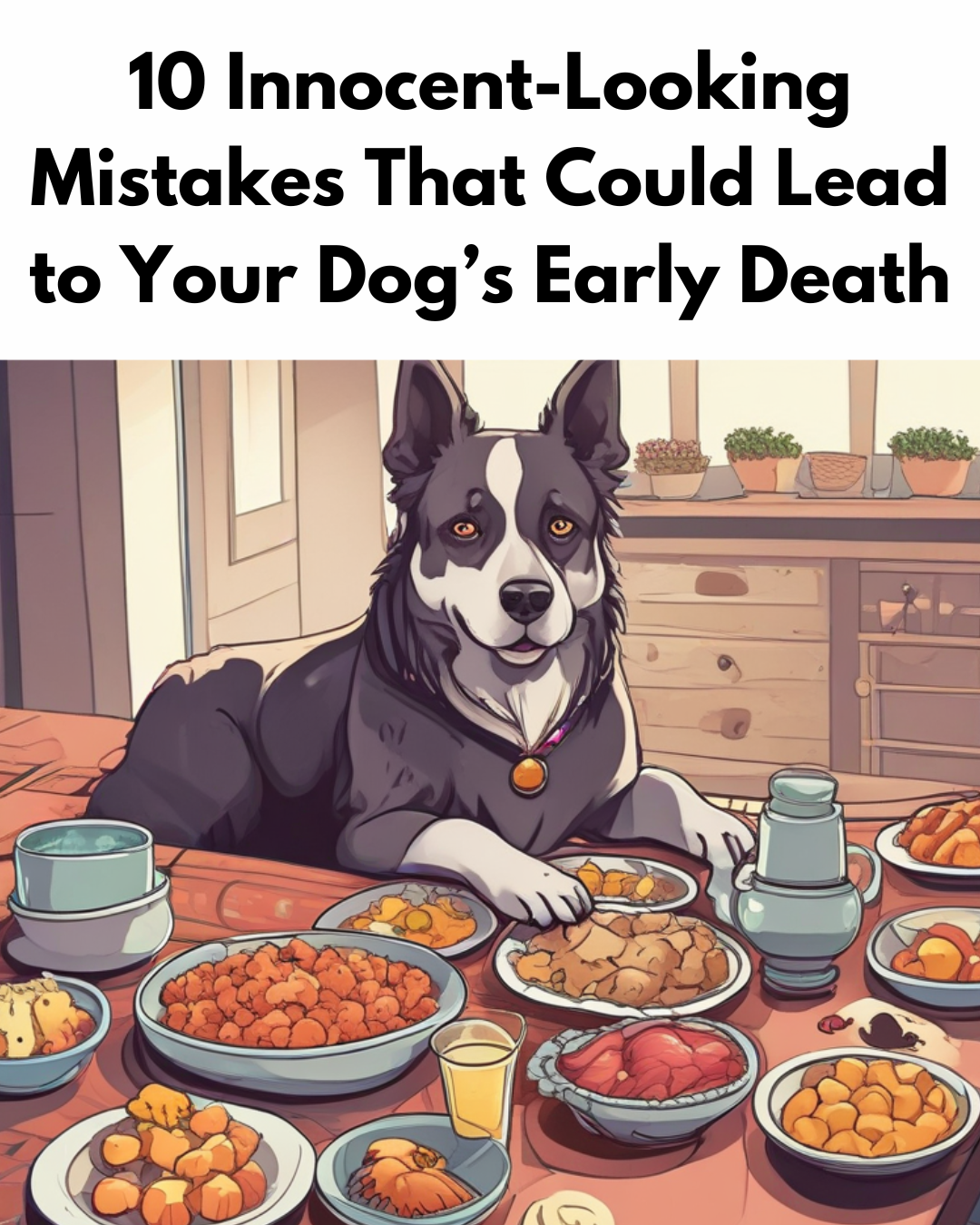Owning a dog is one of life’s greatest joys.
But sometimes, without realizing it, we can make small mistakes that might have serious consequences for our pets.
In fact, these innocent-seeming habits could even shorten your dog’s life.
Let’s explore ten common mistakes and how you can avoid them to ensure your dog lives a long, healthy life.
1. Overfeeding and Free Feeding
It’s tempting to spoil your dog with treats or leave a bowl full of food out all day.
But overfeeding and free feeding are two of the most common ways pet owners contribute to their dog’s premature death.
Obesity in dogs isn’t just about extra pounds; it leads to heart disease, diabetes, joint issues, and a shortened lifespan.
Measure your dog’s food.
Stick to a consistent feeding schedule.
And remember, treats should be an occasional indulgence, not a daily habit.
2. Not Understanding Portion Sizes
Even if you’re not overfeeding, you might be giving too much of the wrong food.
Many dog owners don’t realize that portion sizes depend on breed, size, and activity level.
Feeding your dog too much of even the healthiest food can have the same dangerous consequences as overfeeding treats.
Consult your vet about the right portion size for your dog.
Being exact here can add years to your pet’s life.
3. Ignoring Dental Health
Dental care is often overlooked in dogs, but poor oral hygiene can lead to much more than bad breath.
Left untreated, plaque buildup can turn into gum disease, which can spread infection to the heart, liver, and kidneys.
Brush your dog’s teeth regularly.
If brushing isn’t an option, dental chews or special toys can help reduce plaque.
Consider professional cleanings as your dog ages.
It’s an investment in their overall health.
4. Skipping Annual Vet Checkups
You probably wouldn’t skip your own yearly physical, so don’t skip your dog’s.
Many pet owners assume their dog is healthy if they seem fine on the outside.
But many serious conditions, like cancer or kidney disease, often show no symptoms until it’s too late.
Regular vet checkups can detect issues early, increasing the chances of effective treatment.
Preventive care, such as vaccines and heartworm medication, is essential to keep your dog healthy for the long haul.
5. Letting Your Dog Off-Leash in Unsafe Areas
We all want to let our dogs run free, but doing so in the wrong environment can be fatal.
Even the best-trained dog can be startled by a car, a wild animal, or an unfamiliar noise.
Off-leash accidents, like getting hit by a car or attacked by other animals, are a leading cause of dog deaths.
Always keep your dog on a leash unless you’re in a safe, fenced-in area.
This simple precaution could save their life.
6. Neglecting Mental Stimulation
Just like humans, dogs need mental exercise to stay healthy and happy.
Boredom can lead to destructive behaviors like chewing, digging, and excessive barking.
But more importantly, a lack of mental stimulation can contribute to anxiety and depression, which weakens their immune system over time.
Keep your dog’s mind sharp with puzzle toys, training sessions, and interactive play.
These activities will improve their quality of life and help them live longer.
7. Not Properly Securing Your Dog in the Car
We often see dogs riding with their heads out the window, tongues wagging in the breeze.
But unrestrained dogs in cars are a serious hazard.
In an accident, even a low-speed one, an unrestrained dog can be thrown into the windshield or ejected from the vehicle.
Invest in a dog seatbelt, harness, or crate when traveling.
It’s not just for their safety—it’s for yours as well.
8. Inconsistent Exercise Routines
Dogs thrive on routine, and regular exercise is a critical part of their well-being.
A lack of exercise can lead to obesity, behavioral problems, and even shortened lifespans due to heart disease or arthritis.
Many dog owners believe a simple backyard is enough, but dogs need more than just space—they need engagement.
Aim for daily walks, playtime, and activities suited to your dog’s energy level.
Keeping your dog active helps keep their body and mind in peak condition.
9. Exposure to Toxins Around the House
Household items like chocolate, grapes, xylitol (often found in sugar-free gum), and certain plants are highly toxic to dogs.
Even items like antifreeze or cleaning products, if ingested, can cause serious harm or death.
Be mindful of what’s accessible to your dog.
Store toxic items securely, and know which foods and substances to avoid giving your dog.
If your dog ingests something harmful, contact a vet immediately.
10. Failing to Address Behavioral Problems Early
Minor behavior issues, like excessive barking or chewing, might seem harmless when your dog is young.
But left unchecked, they can turn into dangerous habits.
Aggression, fear, and anxiety-related behaviors can lead to injury—either to your dog or others.
Moreover, the stress of living in a tense or chaotic environment can take years off your dog’s life.
Work on training and behavior correction early.
It’s easier to prevent issues than fix them later, and it ensures a safer, happier life for your dog.
Conclusion
Owning a dog comes with the responsibility of ensuring their health and safety.
These seemingly small mistakes—many of which are made out of love—can have a lasting impact on your dog’s life.
By being proactive, consistent, and attentive to your dog’s needs, you can significantly increase their lifespan.
The goal is to give our dogs the best life possible.
And sometimes, that starts by correcting the little things.




